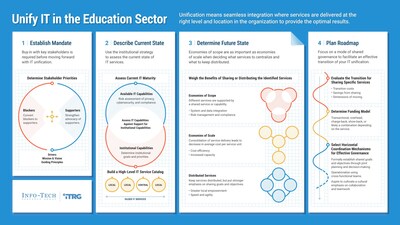Info-Tech Research Group's latest study highlights how education institutions can streamline IT operations to increase efficiency, reduce costs, and improve service delivery. The global research and advisory firm's recently released blueprint addresses the complexities of IT consolidation, focusing on strategic planning, collaborative decision-making, and customized implementation for success. By following Info-Tech's insights, education IT leaders can overcome consolidation challenges and better align IT services with their institution's goals.
TORONTO, May 27, 2024 /CNW/ — The rapid evolution of education technology and increasing pressure to reduce costs have made the need for unified IT services at academic institutions increasingly critical. Fragmented IT infrastructure can lead to inefficiencies, rising costs and reduced confidence in an institution's IT capabilities. To address these challenges, Info-Tech Research Group has launched a new industry resource, “Consolidating IT in the Education Sector.” The firm's expert insights captured in this blueprint will help IT leaders streamline operations, improve service delivery and reduce operational costs, ultimately benefiting the financial and academic health of their institutions.
The Info-Tech Research Group's “Integrating IT in Education” blueprint highlights four key steps leaders should take to successfully integrate IT in academic institutions. (CNW Group/Info-Tech Research Group)
“IT departments in education face the challenge of delivering cost-effective and effective services while the technology itself is becoming increasingly complex and expensive,” said Mark Mabey, principal research director at Info-Tech Research Group. “Many CIOs face the added challenge that technology services are being delivered by multiple providers within the same institution, driving up costs and increasing risk.”
As outlined in the Info-Tech blueprint, obstacles to IT consolidation at educational institutions often stem from improper planning, which can lead to increased workload and hesitation from IT leaders to redesign. Concerns about losing in-house specialized or localized functions can also hinder consolidation efforts. However, the study explains that despite these challenges, IT consolidation is essential because it streamlines operations and improves financial and academic health. Addressing these issues and implementing a coherent IT strategy can help educational institutions become more efficient and effective.
“Successful integration lies not in structure, but in a shared vision for IT service delivery that is underscored by collaborative decision-making,” Maby explains. “Strategic planning and communication are paramount, ensuring guiding principles are aligned with organizational goals. This approach, with its emphasis on efficiency and customization, provides a roadmap for organizations to balance overall efficiency with their individual needs.”
The company's research highlights the need for education IT leaders to effectively communicate the benefits of IT consolidation to key stakeholders. However, some stakeholders are concerned that IT consolidation may impact their organization's ability to make independent decisions about their IT infrastructure. To mitigate these concerns, Info-Tech recommends that IT leaders customize their implementation plans to fit each institution's specific goals, needs, and services.
In its blueprint for IT integration in education, Info-Tech highlights four key steps leaders should take to ensure successful IT integration in academic institutions.
Establish authority: Before moving forward with IT integration, it's essential to get buy-in from key stakeholders. Without their support, the project could fail before it even begins.
Current State Description: Using the institution's strategy, evaluate the current state of IT services. The objective of consolidating IT should go beyond simply reducing costs; it should also support the institution's overall teaching and academic mission.
Determine the future state: Consider both economies of scope and economies of scale. For example, economies of scope provide benefits when different services share underlying services such as security or technical architecture. These benefits can be as important as economies of scale when deciding which services to centralize and which services to keep distributed.
Roadmap planning: Focus on a shared governance mode that can drive IT consolidation while some services remain distributed and decentralized.
Info-Tech's latest plan points out that IT consolidation doesn't necessarily mean complete centralization. Centralizing all IT may work for a large institution, but it may not be a viable approach for a smaller college or university where individual needs are more important. The company explains that by adopting shared services, the benefits of consolidation can be realized without sacrificing the unique requirements of different departments. This flexible approach allows institutions to increase efficiency and collaboration while still maintaining the autonomy needed to meet the needs of different stakeholders, ultimately fostering a more cohesive and effective IT environment.
To receive exclusive, timely commentary from education expert Mark Maby and access the complete Unify IT blueprint for education, contact us at pr@infotech.com.
Infotech Live 2024
Registration is now open for Info-Tech Research Group's annual IT conference, Info-Tech LIVE 2024. The conference will take place September 17-19, 2024 at the famous Bellagio in Las Vegas. This premier event will provide journalists, podcasters and media influencers with access to exclusive content, the latest IT research and trends, and the opportunity to interview industry experts, analysts and speakers. To request a media pass to attend the event or access research and expert insights on trending topics, contact pr@infotech.com.
About Infotech Research Group
Info-Tech Research Group is a leading global research and advisory firm serving over 30,000 IT and HR professionals. The firm conducts unbiased, relevant research and provides advisory services to help leaders make strategic, timely and informed decisions. For nearly 30 years, Info-Tech has worked closely with teams to provide them with everything they need, from practical tools to analyst guidance, to ensure they deliver measurable results for their organizations.
To learn more about Info-Tech's division, check out McLean & Company for HR research and advisory services and SoftwareReviews for software purchasing insights.
Media professionals can sign up for unlimited access to IT, HR and software research and hundreds of industry analysts through the company's Media Insiders program. To gain access, contact pr@infotech.com.
To access information about Info-Tech Research Group and our latest research, visit infotech.com and connect on LinkedIn. X.
Info-Tech Research Group logo (CNW Group/Info-Tech Research Group)
Shishion
View original content to download multimedia:https://www.prnewswire.com/news-releases/unified-it-in-education-info-tech-research-group-releases-guide-to-enhancing-academic-and-operational-efficiency-302156200.html
Source: Info-Tech Research Group
Shishion
To download multimedia, view the original content: http://www.newswire.ca/en/releases/archive/May2024/27/c9115.html





